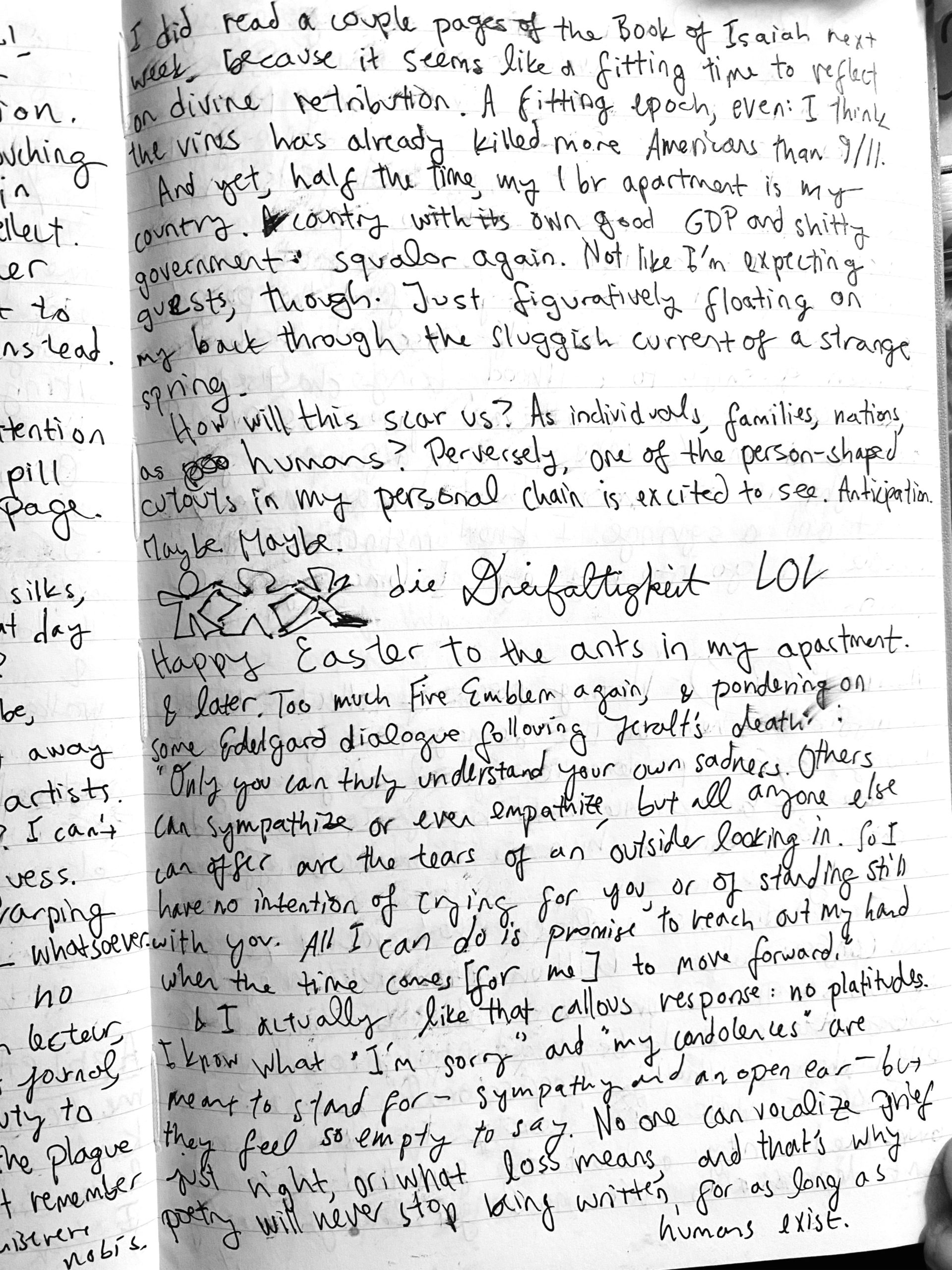This past year expanded the theater of war between the “real” and the “imaginary,” I think. “Alternative facts” became an alternate reality where a large proportion of the US population seemed intent on willing the virus out of existence by simply behaving as if it didn’t exist. Now we have over 360,000 deaths, if we’re to trust World-O-Meter as a source. Forget the stock market: sickness is our largest investment.
I’ve posted before about feeling abstracted, and it’s a feeling that remains. Any time I post here, I feel almost obligated to talk about the pandemic, since it’s dominated a roomy corner of my mind (and probably your mind too, dear reader) since March. There’s an elephant in every room. But it’s also been a year of immersion in the imaginary, a year where the inner world eclipses the outer. I got a copy of House of Leaves for Christmas, and its central premise of a house that’s larger on the inside than on the outside feels oddly current. Imagine a bunker taking root: a retreat from the virus and the sunburnt world of forced vision into an underground labyrinth that expands as you traverse its sticky web of tunnels.
All of this is a lengthy way of saying I’ve been playing a lot of video games. If I spent more time in 2020 thinking about something other than COVID-19 and my personal failings, it was video games. A list of games I played or started (or continued) playing in 2020:
- Pokemon Shield
- Animal Crossing: New Horizons
- This War of Mine
- Legend of Zelda: Breath of the Wild
- What Remains of Edith Finch
- Fire Emblem: Three Houses
- Fire Emblem Heroes
- Fire Emblem Fates (Conquest)
- Layers of Fear: Legacy
- Hollow Knight
- Super Smash Bros Ultimate
- Okami
- Stardew Valley
- Rune Factory 4 Special
- The Witcher 3
- Hades
- Xenoblade Chronicles: Definitive Edition
- Link’s Awakening
- Bioshock
- Oxenfree
- Octopath Traveler
- Tales of Vesperia
The titles I highlighted in blue are games I’ve spent over 100 hours playing. Fire Emblem: Three Houses and ACNH top the list at over 300 hours apiece. I gamed as if gaming were my full-time job. I spent quiet hours reflecting on the games. I finally openly admitted to reading fanfiction – FE3H spurred me to read more of it than ever. I spent hours writing paragraphs on paragraphs arguing about character motives and moral standing on Reddit. I re-realized the depth (and absurdity) of my obsession when I recently found myself delving into semantics and theological history to argue with a similarly obsessed player about whether or not a game character represented the will of divinity.
With the amount of time I spend on gaming, I even feel a capitalist compulsion to search for justification. I’ll never profit from it. You see, I’m not actually good at gaming. Even after all these hours, I’m below average. Why, then?
That eternal, infernal question brings me back to the concept of immersion. My clumsiness in figuring out game mechanics even adds to the chance of getting lost in one digital world or another – it’s like memorizing the strip of sidewalk outside your house in your bumbling attempts to learn how to ride a bike.
A key difference is that even after the sidewalk ends, you can bike on. The world stretches out of sight, beyond the limits of the mind. Games, though, present something like a yarn ball of neatly contained possibilities. The yarn ball is a soft, safe shelter, a warm dark paved with a million possibilities of thread. You can immerse yourself in a ballpit, immerse yourself in a hobby, immerse yourself in an ocean, in a language. The word implies a separation, a surface containing a succinctly named and defined system (does this count as a pun? You know, gaming system. Ha.). Surface tension to prevent leakage between system and world.
From a current events perspective, I experienced 2020 as an anti-systematic year. We saw the US, and many other countries along with it, fail to streamline virus prevention efforts. We saw delayed election results, disputes over once-trusted institutions, a stuttering transition to online work and school, a dissolution of public-private boundaries via Zoom, etc. etc. We saw the shadow of entropy, that enigmatic enemy.
(2020 would not work as a game. The disastrous release of Cyberpunk 2077 is basically 2020 as a game. Highly anticipated. Top tier marketing. Yet even after multiple delays, the game hit the market glitch-riddled. It crashed systems. It lagged. From what I’ve heard, the story wasn’t even that good. The company was forced to offer refunds to everyone who bought it, no questions asked. Unfortunately, the Reaper is not offering refunds on 2020 at this time.)
When I read my course evaluations, a few students (rightly) criticized my slow response times on emails. It’s true – I procrastinated on reading and replying to emails. I procrastinated on grading. I procrastinated on my own assignments. The creeping dread was always there, the figurative Nosferatu fingers stretching long, pale, and sharp around the door. I never lost awareness of the distinction between the fictional and the real, blurry as it may be. Nevertheless, I still find myself succumbing to the urge to shut out the world the way I turn off a game when it gets too frustrating (shoutout to Hollow Knight).
Maybe I love math after all: on some deep, primal level, my sorely limited mind wants the world to be a system, a law, a narrative. A linear progression, maybe. Something subject to a benevolent, controlling force. Maybe playing games is a search for God, or for the America we learned about in primary school textbooks, or for a year where we all actually follow the resolutions we set for ourselves. A world where the past doesn’t ooze into the present. A world where intellectualizing doesn’t necessitate cold dissociation.
If I learned anything this past year, I learned that that kind of dissociation is both dangerous and necessary.
Self-contained fictional worlds got me through the months alone. They gave me idols I’ll never have to kill, idols with no closets to hide skeletons in. Myriad worlds illuminated in soft incandescence. No sunburns or temporary blindness. They also enabled my shitty, avoidant coping mechanisms. The list of unread emails is not growing smaller. People are not growing less disappointed. The barrage will not cease.
I see that paradox in my own life, and in the personified life of this country. I remember an introductory German history class I took in undergrad covering a chapter about the Black Death. We discussed the warring, intertwined concepts of carpe diem and memento mori: “seize the day” and “remember you will die.” In contemporary translation, maybe “lol YOLO” or “it’s just the flu, bro!” versus “Jesus Christ, there’s a pandemic! People are dying!” The YOLO crowd feeds into the number of deaths. The knowledge that any given day could be your last feeds into the YOLO urge. Carpe diem is justified by memento mori. In spite of my frustration, I genuinely sympathize with the people who are pretending the virus doesn’t exist. It’s difficult to remain invested in a future you can’t take for granted. And we can’t really say our culture encourages altruistic sentiments.
(Incidentally, my new favorite video game character, Edelgard from FE3H, is someone principally characterized as willing to sacrifice present comforts for the sake of a better future. Don’t click that link if you don’t want spoilers for the game, btw.)
As much as I want to embrace the Taoist appreciation for paradoxes, this one strikes me as deeply sad. Live to die; die to live. Sacrifice your “real” life at the altar of pretty systems. Or vice versa.
Is grey the ugliest color?
Is there a self-help book to help one find balance? And can it be expanded to cover the wide world of individuals? (Ah, there it is. The longing for systems.)
To close, I want to bring up another game, one that only takes a couple hours to play through. What Remains of Edith Finch is a multi-platform game I initially encountered through a video of a full playthrough in a movielike, commentary-free format. Intending to watch the first ten minutes or so to decide if I wanted to buy the game, I found myself drawn in and watched it all at once. I have since played the game, but you can watch the linked video like a movie without losing much of the experience.
In the game, you assume the first person perspective of the titular Edith Finch, a 17-year-old girl who returns to her abandoned family home as its last surviving member. We learn almost immediately that the death of Edith’s brother Lewis seven years before had catalyzed her now-deceased mother’s decision to flee the house, a whimsical monstrosity that looks like Howl’s castle with a Tim Burton aesthetic. Edith has been raised to see the house as a physical manifestation of a cross-generational family curse. The game’s narrative covers the deaths of the family – vignettes of an inherited, lethal curse, if you will. But the truth of the curse is never revealed. Perhaps there’s a supernatural culprit; perhaps not.
In any case, without spoiling the individual stories, I was struck by a common thread among the stories. The untimely deaths in the Finch family are all tied to a victory of imagination over reality – that is, until reality wins with the deaths of the imaginers. We see hallucinations, dissociation, grand plans, reveries, and (perhaps) a cross-generational self-fulfilling prophecy. Another embrace of carpe diem and memento mori; another tragedy.
I’ve spent the past year halfheartedly resenting my own abstraction from the slow-motion car crash we’ve all been collectively witnessing. But to immerse oneself in an imperfect system feels akin to a dive towards the sun to become another Icarus.
Color is molten. Color is an undertow. For now.
Fragments of poems come to mind: from Tracy K. Smith: “faces radiant with panic.” From Sylvia Plath: “the blood jet is poetry.” It’s hard to read poems at all when the chills come from the same source as the fear. The radiance is the panic. Blood is life is death. Also from Plath: “This is the silence of astounded souls.”
My greatest hope for 2021 is that color can bloom again without overwhelming this carefully cultivated grey ecosystem.
To actually close, I’ll add some photos from my camera roll that have that 2020 feel. With black-and-white filters, of course, for that narrative cohesion and dramatic effect we all crave.

(trash accumulates)

(journal entry from easter 2020)

(self-portrait: overexposed)